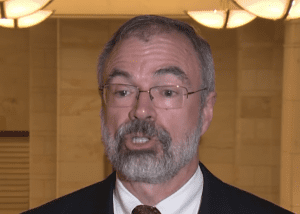GOP congressman mocks medical experts: 'We're safer from death if we're not born'
Rep. Andy Harris (R-MD) has pushed for reopening business despite the potential for an increase in deaths.

Recent data has shown that the number of cases of COVID-19 infection is continuing to rise across the country, even as some states rush to reopen for business.
From a May 6 House hearing:
REP. ANDY HARRIS (R-MD): Why wouldn’t we just have very intensive education processes, so that every American follows social distancing, wearing a mask, and you know, hand hygiene. So we kind of hammer this in, because these are the principles, and get a test if you are symptomatic.
TOM FRIEDEN, former director of CDC: I think that’s correct. I think we can do both, and we have to do both because this is a very infectious virus, and it’s very deadly for certain people.
HARRIS: But the criteria for reopening include the need — and I’ve seen this, where it’s been suggested, don’t reopen until you have contact testing in place.
FRIEDEN: What we can say is, you will be safer if you’re able to open with contact tracing in place.
HARRIS: We’re safer if we’re not born. We’re safer from death if we’re not born, right? I mean, the bottom line is there’s some element of risk.
And I’ll bring this back to, you know, stay at home might work in New York because if you leave your home in New York you’re going to get on a train, you’re going to get on a subway, you’re going to get in a crowded street.
But if you’re in my — in parts of my district — you’re going to leave home, get in your car or truck, drive to a store that has almost no customers in it, conduct your business, and go back home. Because that’s normally the way you live.
So why would you insist that, or why is there insistence that stay-at-home — the broad blanket statement, “It’s effective” — because I’m not sure it adds anything more in the instance I just gave you in a rural area.
Published with permission of The American Independent Foundation.
Recommended

Biden campaign launches new ad focused on Affordable Care Act
Former President Trump has said he wants to do away with the popular health care law.
By Kim Lyons, Pennsylvania Capital-Star - May 08, 2024
Ohio doctors fear effects of emergency abortion care case set to go before U.S. Supreme Court
A federal law that allows emergency departments to treat patients without regard to their ability to pay will be under U.S. Supreme Court scrutiny this week, and Ohio doctors are concerned about the case’s local impact on emergency abortion care.
By Susan Tebben, Ohio Capital Journal - April 23, 2024
House GOP votes to end flu, whooping cough vaccine rules for foster and adoptive families
A bill to eliminate flu and whooping cough vaccine requirements for adoptive and foster families caring for babies and medically fragile kids is heading to the governor’s desk.
By Anita Wadhwani, Tennessee Lookout - March 26, 2024









































































